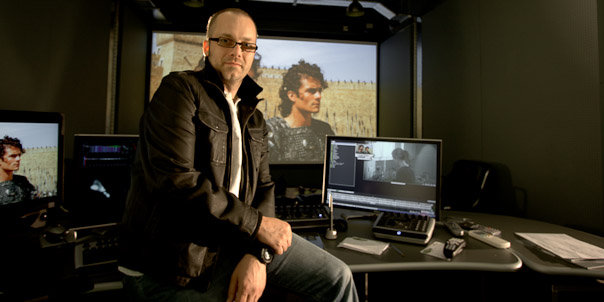ASK & DISCUSS
INDEXThe Indie Web-Series Model
10 years, 3 months ago - Nick Hilton
So, a lot of the indie filmmakers I encounter in the UK – especially over the last couple of years – have moved their attentions from short films and the festival circuit to web-series, and trying to gain some degree of online fame. Of course, like all things, as more people have started doing it, the market has become way over-saturated and it's much harder to make something eye-catching that breaks out of the middling YouTube doldrums.
I don't know how many SP members have web-series, but I started work on one at the tail end of last year. It was intended to be just a fun project with a few people I'd met, and I cashed in a few favours because I had very little money to make it. Anyhow, I wanted to raise a few issues/thoughts for discussion on here – I'd love to get the thoughts of other people who have either tackled a web-series, or considered it.
1) The Money – When you start out with a web-series, it's very hard to get any money for it, other than private finance. There are, to the best of my knowledge, no funding bodies for web shows, and it's very hard to predict the amount of revenue from advertising. I understand that the most popular web-series can supplement advertising revenue with product placement and sponsorship deals, but that's not the case for anyone starting out. So how can we work around the financing issues without exploiting people? I've tried to make my project a collaborative one, very flexible, working on people's off-days and only if they want to keep doing it, no obligations. But short of dipping further into my savings, how can I keep making my middling web-comedy? (and yes, making it better would help!)
2) The Market – My web-series was pretty good. A little rough around the edges, because it had to be shot very quickly with not many crew members, but I'm pretty happy with the product. And it had a great response, especially from people who had a vested interest in the product (the show is about Harry Potter fandom). The first episode has roughly 2000 views, and the next two have fewer. So, despite the great feedback, it hasn't cracked its market. Has anyone had any success with pushing their show? I must've sent the press release to hundreds of people and only got a few responses (and some responses after the show had got a bit of traction) from smaller websites. No luck cracking Buzzfeed or Radio Times or Entertainment Weekly, and that seems to be necessary in order to get an audience for your show.
3) The Logistics – This is a more hypothetical thing, that I was curious about. I intended for my project to be collaborative, and not excessively dominated by me as the nominal 'Creator'. So, in my head, I was open to other Writers and Directors taking a crack at an episode, and I would sit back and Produce but not directly interfere. Has anyone done anything like this? I think it would be a fun way for young writers/directors to get experience, or for any writers/directors who just fancied a fun, quick project. But maybe this model doesn't work with web-series, especially if they're single-person passion projects. But I do think that, long term, the show would be more viable if more people were involved in the creative process.
There are loads of other points that I could make about independently making a web-series, but I'd love to hear your experiences/thoughts. Maybe I'm talking a load of nonsense! Maybe you have a completely different experience. Feel free to call me out on anything I've said, I just wanted to spitball how to make a better indie web-series!
Only members can post or respond to topics. LOGIN
Not a member of SP? JOIN or FIND OUT MORE
10 years, 2 months ago - Lee 'Wozy' Warren
Monetizing the series is just one of the goals we have, but it's not the main goal. When you have a couple of TV drama shows under your belt and a slate of projects in development, the bigger picture becomes the main attraction. It's the bigger picture that some investors are interested in, not solo projects.
As an Indie, you have to look at a project, be it a TV show, a feature or a web series, and ask a simple question. Will my credibility in the industry increase through this next project or will the risks outweigh and reduce my credibility. For me, a financial return is important, but so is building my credibility. So it's a balancing act between those two. Our investors see that and count on us doing the right thing over a 'number' of projects, with the credibility increasing with each. Then with each we move up the ladder.
I can't go into any specifics because they are unique to us as a business and our strategic goals with our 'partners' and are confidential. However, we do aim to add to our roster of different web series at the end of season 1 and will be looking for additional producing partners at that time.
10 years, 2 months ago - Glyn Carter
Good discussion. Continuing series are just too damn hard, in terms of writing and collaboration and cost, to sustain for the 20 episodes needed to gain traction. So I'm going down the "episodic sketch-based" route - a series of shorts linked by the fact that they all take place in bedrooms. I can bring in new writers actors and directors, and work on the production and publicity side. It won't make money (it might, but it's a lottery), but it won't cost an arm and a leg either. If even one episode takes off, everyone involved in the whole series will benefit.
Called "Pillow Talk" and launching soon, check out the trailer on YouTube via http://bit.ly/1gnJMNB. And more on my website blog www.storiesintolight.co.uk
10 years, 2 months ago - Nick Hilton
Had a watch of your trailer and I see what you're going for. FWIW (and I don't know if you are looking for feedback, so feel free to ignore) I found the subtitles (Centurion, Full English..etc) kind of hard to understand. I get, having watched it, that those are the names of the sketches, but that didn't seem obvious to begin with and it was a bit distracting. I think you can let the writing/acting stand on its own! And I think that, for the trailer, it could do with a bit of music throughout, just to keep the pace up. But looks like a fun series!
There's a series called 3some (or Threesome, maybe) which is a British comedy which deals with some of that bedroom farce stuff. Might be worth checking out (they also did pretty well in terms of viewers because they used sensible tags like, err, threesome).
10 years, 2 months ago - Marlom Tander
Keywords Rock! One day I did a series of very short vids for a schools history project.
Views are (after some years), 761, 256, 1028, 111, 477 and 196,776.
Guess which has the words Victorian and Punishment in the title :-)
With YT, although they do keywords, I think it's display priority is very heavily weighted to titles, so good words in titles is def something to go for.
10 years, 2 months ago - Lee 'Wozy' Warren
100% private sources. They're out there. Just gotta look. It's all about network building, nurturing and developing.
10 years, 2 months ago - Marlom Tander
@Nick Hilton if your plan is "get money from views" then 1000 views to the dollar(ish) on YouTube seems a good ball park assumption number. It's what I concluded from research and what a small niche channel I'm involved with gets.
I think if you get big views (million plus) you get enhanced payouts and extra features/help from YT.
10 years, 2 months ago - Lee 'Wozy' Warren
Funny - I'm going to the other way - serial drama. Already have the finance, the writers (I'm showrunner) a production company and directors.
10 years, 2 months ago - Richard Connew
I started the first 3D web series in 2010 and in many ways had much the same problems you did with a small crew, how ever I did because it was 3D get into Japan and China and do quite well there. I tried Mobile as well with the thought this could be a daily video clip on the way to work but that didn't really work well either. My conclusion is a web series is a massive amount of work for generally no reward and you personally end up doing nearly all of it which is fine is you can continue for the length of time it takes to get any where. I now make 3D feature films (a lady at SKY 3D when I submitted the 3D series to them suggested 3D feature films would do better and she was right!) most of which end up in Japan and China where they love them. This way I can make a living and am slowly cracking other markets as well albeit in the 2D format. Its hard work and at times pretty thankless but if you stick at it you will get some where. Feature films are extremely hard work and most of mine take well over a year to make which is why most directors only ever make 1, its also the reason why if you stick at it you will succeed.
10 years, 2 months ago - Nick Hilton
That's really interesting. A 3D web-series is such a fundamentally sellable idea, because you must've been one of the first to be doing it.
I guess I don't see the opposition being between a web-series and feature films (probably not for most people anyway) but between a web-series and shorts, or a web-series and nothing. For me, a web-series is a way of producing new work quickly, efficiently and getting it out there without having to go through months or years of disappointing festival screenings to a man and his dog, or, worse, rejections. Web-series have an immediacy of engagement and feedback that I think other types of film lack – I can shoot something and, within a couple of weeks, have it out in the world, zooming its way to Hollywood.
10 years, 2 months ago - Paddy Robinson-Griffin
More general thoughts to make of what you will... ;)
Episodic dramas mean people coming back which means a cliffhanger every show which means jeopardy which means connection which means character which means screen time which means time. Without characters that people care and identify with, they won't be back, but how do you manage that in a few minutes? I don't honestly know if it can be done, at least not without some incredibly skilful writing and performance, and even then it takes screen time.
Ever see 'The Constant Gardener'? Great author, great direction, lovely production, fabulous cast, but the love between the 2 leads was not as real as in the book because (for screen and story purposes) they montaged it. I learned from that film that you can't hurry love. Phil Collins would be proud. But it takes real screen time to get to know a character, which is why soaps are popular, and even why you see the same TV presenters over and over again. With short form drama, the audience don't have the same character investment, so threatening to kill your lead means nothing to them.
You may shortcut it slightly by using somebody else's creative work as the basis for your own. I don't think it's cheating per se, JKR is richer than the Queen so you're not talking bread from her mouth, the film studios will see it differently of course and may come for you if you get successful. Anyway, using that preexisting world at least means not having to start from scratch.
Length - short means SHORT. Even for older guys like me, viewing habits on YouTube are different from TV. You have mere moments to get my attention, so concentrate the goodness. I can spot filler a mile off, so can your audience. Be ruthless.
10 years, 2 months ago - Nick Hilton
I should clarify that my show is based on Harry Potter fandom – it's about a group of adults who meet in a book club to read Harry Potter together (for ref: https://youtu.be/UgYThBS1LPo?list=PLj5G6TbCBx747XMDh0Y9U0IKzojF14PyA )
Other than that, I agree with all your points. I think that, if you're going to use the 'Cliffhanger model' of retaining an audience, you have to be very confident in your production quality. TV does such a great job of this that it's hard for web only stuff, especially indie stuff, to replicate the sensation. Which I think is why, in general, sketch-based stuff is more successful. With my series, I've tried to design it so that a viewer doesn't need to have seen the previous episodes. So, whilst it's designed to be watched in a certain order, it doesn't matter if it's not. When I do some more episodes, I'm going to take that further and remove the episode numbering. They will still be available, via a playlist, in the order I intended, but I don't want to pressurise the audience to view each one. It's noticeable to me that Episode 1 has 3x as many hits as either of the other two.
I agree about length too, and it's something I preach to people whenever they ask about shorts. I'm keeping my episodes under 4 minutes, which is maybe longer than the optimal web-series duration, but probably the minimum I could use to engage the viewer given that the show isn't punchline heavy and relies upon back-and-forth dialogue.
10 years, 3 months ago - Nick Hilton
Yeah, I agree entirely. The best web-series (without money) seem to be the ones which are single character driven, or the ones that are done by a close group of collaborators.
I'd like to speak to people who've done more successful web-series and ask them how they funded it and/or how they maintained enthusiasm for the project. Stopping and starting has been one of the main momentum killers for me so far – if it had been a 7 day shoot, that would be one thing, but a day here, a day there, and it gets much easier to avoid. So maybe that's another key: stock up on production days to ensure you have enough footage to keep putting out content until such a point as you can shoot again.
10 years, 2 months ago - Nick Hilton
Very interesting response, although I'm not sure I agree with your assessment of traditional/digital media (maybe because it's partly how I make a living!).
In the past, I've spoken with people who've had their web-series featured in The Guardian, and they said that was a massive boon to their success. That said – an article I published on a site I work for was recently linked into from an Independent article and that was worth, I think, 14 clicks to us. So there are definitely ways in which it works.
I think that once one pin falls, the rest will go. You mention Harry Potter fansites, well, that's basically the only place I've had success. I've had support from the biggest one in the world and been interviewed by a few others. But those communities aren't what they used to be, and a large amount of the users from them have migrated to Facebook/Twitter, not to mention Buzzfeed.
10 years, 3 months ago - Paddy Robinson-Griffin
I think a lot fizzle out for precisely the reasons you've identified - money and collaborative time.
Each collaborator is effectively subsidising the project, so you'll hit a natural tail-off point when they frankly want their weekends back to spend with family, etc. This is especially true for anyone behind the camera with no chance of 'getting spotted'! This is probably why most successful series are single person, factual, to-camera series. As soon as you introduce narrative, you take more time for results, so you're not regular enough, and people have short attention spa... Oh look! A squirrel!
10 years, 2 months ago - Marlom Tander
Most web channels are one person doing it for the lols and they beaver away and then get discovered.
Take Yogscast - gamers who took to video and had modest niche non commercial success and kudos for about 2 YEARS. What made them was that they spotted Minecraft very early on and then got watched by all the MineKids. That made them viral.
But many more did the two years and never progressed/hit the spot.
If you want a web series to take off you need to know how to reach the audience. And that means people interested in related areas.
You had a Potterworld concept? And you thought the radio times would help? You should have been on the fan sites, the HP bloggers etc.
In 1997 my then 3 year old financial advice web site (initially hobby, semi pro by 97) was running at 30,000 uniques a month. The Sunday Times then did a half page write up in the Money section. My logs showed that to be worth 700 visitors.
Internet success is based on VERY EXPENSIVE advertising, SEO or word of mouth. Traditional media, and buzzfeed, is simply not important, and never has been. It's been social and SEO ever since Usenet, BBS and Lycos.
That said, web based episodic drama is an as yet uncracked model. Free standing but interelated sketches seem to be the closest thing that works.
But if I wanted to push that boat, I'd not start unless I could do 20 (because you have to assume that you'll be teens in before people notice), and I'd really work the social side, making a massive effort to find the right places, and get involved with them so that your posts have kudos BEFORE you say "come look at my vids".
Good luck.





